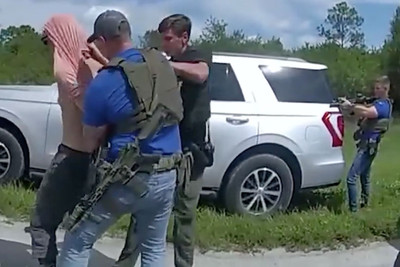Ryan Wesley Routh, the individual involved in the incident at Trump International Golf Club in Florida on September 15th, has become a subject of intense online speculation, particularly concerning his political affiliations and origins. Rumors have circulated widely across social media platforms, with some users labeling him as a “registered Democrat” and others as a “Republican.” This article aims to provide a factual account of Ryan Wesley Routh’s background, address the question of where Ryan Wesley Routh is from, and clarify the misinformation surrounding his political leanings.
Unveiling Ryan Wesley Routh’s Origins and Background
Ryan Wesley Routh, aged 58, is currently facing serious federal gun charges after allegedly positioning himself near Trump International Golf Club in West Palm Beach, Florida, under circumstances that suggest a potential assassination attempt on former President Donald Trump. Law enforcement authorities are actively investigating the situation, and further charges may be forthcoming as the inquiry progresses.
Update: As of September 26th, Routh has been officially indicted for the attempted assassination of a major presidential candidate, underscoring the gravity of the allegations.
Despite not discharging any weapon, Routh’s actions triggered a significant response. Cell phone data analysis revealed that he had been present in a wooded area adjacent to Trump International Golf Club for approximately twelve hours leading up to the incident on September 15th. Former President Trump was reportedly present at the golf club at the time. A Secret Service agent first detected a rifle “poking out of the tree line,” prompting the agent to fire in the direction of the firearm. Following this, Routh fled the scene, as detailed in the criminal complaint filed in the U.S. District Court for the Southern District of Florida.
 Ryan Wesley Routh, a suspect in an apparent assassination attempt on former President Donald Trump in Florida on Sept. 15, is placed under arrest. Photo by Martin County Sheriff’s Office / Handout/Anadolu via Getty Images.
Ryan Wesley Routh, a suspect in an apparent assassination attempt on former President Donald Trump in Florida on Sept. 15, is placed under arrest. Photo by Martin County Sheriff’s Office / Handout/Anadolu via Getty Images.
Subsequently, police apprehended Routh on I-95. A search led to the discovery of a loaded semiautomatic rifle equipped with a scope in proximity to his alleged location near the golf course.
Federal charges have been levied against Routh, including possession of a firearm by a convicted felon and possession and receipt of a firearm with an obliterated serial number, further highlighting the legal ramifications he faces.
In the aftermath of Routh’s arrest, former President Trump engaged with the incident on his social media platform, Truth Social. Initially, he expressed gratitude to law enforcement officers for their swift action. Subsequently, he utilized the event to solicit campaign donations, urging supporters to “FIGHT, FIGHT, FIGHT!!!!!” and attributed the incident to Democratic politicians and “Communist Left Rhetoric,” claiming they were responsible for “bullets … flying.”
The political dimension of the incident was further amplified by social media users. Claims rapidly spread alleging that Routh, despite “looking like a MAGA republican,” was actually a “registered democrat” and even had “intimate connections to the highest echelons of the Democratic Party.” The purported evidence for the latter claim was a photograph showing Routh alongside chef José Andrés, who holds a position as co-chair of the President’s Council on Sports, Fitness & Nutrition, appointed by President Joe Biden.
Conversely, voices on the left sought to portray Routh as aligned with conservative ideologies. Posts emerged asserting that Routh “voted for Trump in 2016, was a huge anti-vaxx conspiracy nut,” and “showed support for Nikki Haley and Vivek Ramaswamy.” Some narratives went as far as falsely labeling Routh as a registered Republican, with one post on Threads stating, “MAGA’s can try to spin this all they want, but Ryan Wesley Routh (today’s shooter) is a Republican and voted for Trump in 2016.”
Tracing Ryan Wesley Routh’s Political Affiliations and Voter History
To address the swirling rumors and provide clarity on Ryan Wesley Routh’s political background, an examination of his voter registration history is essential.
According to records from the North Carolina State Board of Elections, Ryan Wesley Routh’s initial voter registration occurred in North Carolina in 1988, at which time he registered as a Democrat. In 2002, he changed his party affiliation to “unaffiliated.” Subsequently, in 2003, his name was removed from the voter rolls due to a felony conviction.
This felony conviction stemmed from a guilty plea in December 2002 for possession of a weapon of mass destruction. Court records describe the incident as involving a binary explosive device with a blasting cap or detonator. Details surrounding the circumstances of this arrest are not readily available in public records. Attempts to reach out to Routh’s defense lawyer and the prosecuting attorney for further information were unsuccessful.
North Carolina law permits felons to re-register to vote after serving their sentence. Routh re-registered in 2005, again choosing to be unaffiliated with any political party.
However, Routh was once again removed from the voter rolls in 2010 following a second felony conviction. This conviction resulted from a guilty plea to three counts of possession of stolen property in March 2010. The stolen items included marble bathroom sinks valued at $180, welding equipment worth over $1,000, and three kayaks also valued at more than $1,000.
Court records, including an application for a search warrant, indicate that Routh, who operated a roofing company, stored the stolen items in a trailer on his property and in a warehouse linked to his business.
Routh re-registered to vote for a third time in 2012, maintaining his unaffiliated status.
Around 2018, Routh relocated to Hawaii and established a business focused on constructing simple housing structures for homeless individuals.
While Hawaii’s voter registration records are not publicly accessible, confirmation from Vaughn Cotham, a senior elections clerk in Honolulu, confirms that Routh is currently an active registered voter in Hawaii. Crucially, Hawaii does not register voters by party affiliation, and it operates under an open primary system. Therefore, Routh’s current party preference in Hawaii, if any, is not a matter of public record.
Despite the lack of party affiliation in Hawaii’s voter records, public records indicate that Routh voted in the Democratic primary in North Carolina in March of an unspecified year (likely prior to his move to Hawaii). North Carolina allows unaffiliated voters to participate in either party’s primary, but only in one primary election per cycle.
Federal Election Commission records reveal that Routh’s history of federal campaign contributions is minimal. However, starting in 2019, he began making small donations, totaling approximately $140, in support of Democratic candidates.
Routh’s political expressions on social media present a mixed picture. Reports indicate that he stated on his now-suspended X account in 2020 that he had voted for Trump in 2016 but had become disillusioned with the former president. He also expressed support for independent Senator Bernie Sanders and former Representative Tulsi Gabbard, both of whom were then seeking the Democratic presidential nomination. Notably, Gabbard has since left the Democratic Party and become an independent.
In January of an unspecified year, Routh reportedly voiced support for Vivek Ramaswamy, who was at that time a candidate for the Republican presidential nomination.
Furthermore, Routh has demonstrated strong opinions regarding the Russian invasion of Ukraine. In February 2023, he self-published an e-book on Amazon that generally expresses support for Ukraine.
In conclusion, Ryan Wesley Routh’s political history is complex and multifaceted. The available evidence indicates that he has not been formally affiliated with any political party since 2002, operating as an unaffiliated voter in both North Carolina and Hawaii.
Editor’s note: FactCheck.org collaborates with Meta to combat misinformation on social media platforms. Our fact-checking work is editorially independent.
References
Federal Bureau of Investigation. Press release. “FBI Statement on Incident in West Palm Beach, Florida.” 15 Sep 2024.
News Conference on Investigation Into Apparent Assassination Attempt on Former President Trump. C-SPAN. 16 Sep 2024.
U.S. v. Ryan Wesley Routh. Case no. 9:24-mj-08441. Criminal complaint. U.S. District Court for the Southern District of Florida. 16 Sep 2024.
Gannon, Patrick. Spokesman, North Carolina State Board of Elections. Email to FactCheck.org. 16 Sep 2024.
State of North Carolina v. Ryan Wesley Routh. Case No. 02CR083088-400. Docket. Guilford Superior Court. Disposed 20 Dec 2002.
State of North Carolina v. Ryan Wesley Routh. Case No. 02CR083088-400. Guilford Superior Court. Disposed 20 Dec 2002.
State of North Carolina v. Ryan Wesley Routh. Case No. 10CR068060-400. Docket. Guilford Superior Court. Disposed 3 Mar 2010.
State of North Caroline v. Ryan Wesley Routh. Case No. 10CR068059-400. Guilford Superior Court. Disposed 3 Mar 2010.
Huff, Daryl. “Suspect in Trump’s apparent assassination attempt had no ties to Ukraine peace movement in Hawaii.” Hawaii News Now. 16 Sep 2024.
Cotham, Vaughn. Senior elections clerk, Honolulu Election Division. Telephone interview with FactCheck.org. 16 Sep 2024.
North Carolina State Board of Elections. Ryan Wesley Routh voter details. Accessed 16 Sep 2024.
Federal Election Commission. Individual contributions — Routh, Ryan. Accessed 19 Sep 2024.
Brennan, David, Chris Looft and Julia Reinstein. “Trump suspect told Iran ‘you are free to assassinate Trump’ in apparent self-published book.” ABC News. 16 Sep 2024.

